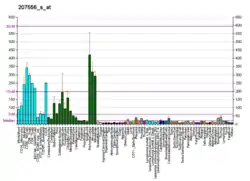DGKZ
Diacylglycerol kinase zeta is an enzyme that in humans is encoded by the DGKZ gene.[5][6]
The protein encoded by this gene belongs to the eukaryotic diacylglycerol kinase family. It may attenuate protein kinase C activity by regulating diacylglycerol levels in intracellular signaling cascade and signal transduction. Alternative splicing occurs at this locus and three transcript variants encoding three distinct isoforms have been identified.[6]
References
- GRCh38: Ensembl release 89: ENSG00000149091 - Ensembl, May 2017
- GRCm38: Ensembl release 89: ENSMUSG00000040479 - Ensembl, May 2017
- "Human PubMed Reference:". National Center for Biotechnology Information, U.S. National Library of Medicine.
- "Mouse PubMed Reference:". National Center for Biotechnology Information, U.S. National Library of Medicine.
- Bunting M, Tang W, Zimmerman GA, McIntyre TM, Prescott SM (Jun 1996). "Molecular cloning and characterization of a novel human diacylglycerol kinase zeta". J Biol Chem. 271 (17): 10230–6. doi:10.1074/jbc.271.17.10230. PMID 8626588.
- "Entrez Gene: DGKZ diacylglycerol kinase, zeta 104kDa".
- Luo, Bai; Prescott Stephen M; Topham Matthew K (Oct 2003). "Protein kinase C alpha phosphorylates and negatively regulates diacylglycerol kinase zeta". J. Biol. Chem. 278 (41): 39542–7. doi:10.1074/jbc.M307153200. ISSN 0021-9258. PMID 12890670.
Further reading
- Maruyama K, Sugano S (1994). "Oligo-capping: a simple method to replace the cap structure of eukaryotic mRNAs with oligoribonucleotides". Gene. 138 (1–2): 171–4. doi:10.1016/0378-1119(94)90802-8. PMID 8125298.
- Ding L, Bunting M, Topham MK, et al. (1997). "Alternative splicing of the human diacylglycerol kinase zeta gene in muscle". Proc. Natl. Acad. Sci. U.S.A. 94 (11): 5519–24. Bibcode:1997PNAS...94.5519D. doi:10.1073/pnas.94.11.5519. PMC 20810. PMID 9159104.
- Suzuki Y, Yoshitomo-Nakagawa K, Maruyama K, et al. (1997). "Construction and characterization of a full length-enriched and a 5'-end-enriched cDNA library". Gene. 200 (1–2): 149–56. doi:10.1016/S0378-1119(97)00411-3. PMID 9373149.
- Topham MK, Bunting M, Zimmerman GA, et al. (1998). "Protein kinase C regulates the nuclear localization of diacylglycerol kinase-zeta". Nature. 394 (6694): 697–700. Bibcode:1998Natur.394..697T. doi:10.1038/29337. PMID 9716136. S2CID 204999472.
- Liu Z, Chang GQ, Leibowitz SF (2001). "Diacylglycerol kinase zeta in hypothalamus interacts with long form leptin receptor. Relation to dietary fat and body weight regulation". J. Biol. Chem. 276 (8): 5900–7. doi:10.1074/jbc.M007311200. PMID 11078732.
- Topham MK, Prescott SM (2001). "Diacylglycerol kinase zeta regulates Ras activation by a novel mechanism". J. Cell Biol. 152 (6): 1135–43. doi:10.1083/jcb.152.6.1135. PMC 2199204. PMID 11257115.
- Hogan A, Shepherd L, Chabot J, et al. (2001). "Interaction of gamma 1-syntrophin with diacylglycerol kinase-zeta. Regulation of nuclear localization by PDZ interactions". J. Biol. Chem. 276 (28): 26526–33. doi:10.1074/jbc.M104156200. PMID 11352924.
- Santos T, Carrasco S, Jones DR, et al. (2002). "Dynamics of diacylglycerol kinase zeta translocation in living T-cells. Study of the structural domain requirements for translocation and activity". J. Biol. Chem. 277 (33): 30300–9. doi:10.1074/jbc.M200999200. PMID 12015310.
- Zhong XP, Hainey EA, Olenchock BA, et al. (2002). "Regulation of T cell receptor-induced activation of the Ras-ERK pathway by diacylglycerol kinase zeta". J. Biol. Chem. 277 (34): 31089–98. doi:10.1074/jbc.M203818200. PMID 12070163.
- Strausberg RL, Feingold EA, Grouse LH, et al. (2003). "Generation and initial analysis of more than 15,000 full-length human and mouse cDNA sequences". Proc. Natl. Acad. Sci. U.S.A. 99 (26): 16899–903. Bibcode:2002PNAS...9916899M. doi:10.1073/pnas.242603899. PMC 139241. PMID 12477932.
- Zhong XP, Hainey EA, Olenchock BA, et al. (2003). "Enhanced T cell responses due to diacylglycerol kinase zeta deficiency". Nat. Immunol. 4 (9): 882–90. doi:10.1038/ni958. PMID 12883552. S2CID 27265140.
- Luo B, Prescott SM, Topham MK (2003). "Protein kinase C alpha phosphorylates and negatively regulates diacylglycerol kinase zeta". J. Biol. Chem. 278 (41): 39542–7. doi:10.1074/jbc.M307153200. PMID 12890670.
- Abramovici H, Hogan AB, Obagi C, et al. (2004). "Diacylglycerol kinase-zeta localization in skeletal muscle is regulated by phosphorylation and interaction with syntrophins". Mol. Biol. Cell. 14 (11): 4499–511. doi:10.1091/mbc.E03-03-0190. PMC 266768. PMID 14551255.
- Ota T, Suzuki Y, Nishikawa T, et al. (2004). "Complete sequencing and characterization of 21,243 full-length human cDNAs". Nat. Genet. 36 (1): 40–5. doi:10.1038/ng1285. PMID 14702039.
- Davidson L, Pawson AJ, López de Maturana R, et al. (2004). "Gonadotropin-releasing hormone-induced activation of diacylglycerol kinase-zeta and its association with active c-src". J. Biol. Chem. 279 (12): 11906–16. doi:10.1074/jbc.M310784200. PMID 14707140.
- Luo B, Prescott SM, Topham MK (2005). "Diacylglycerol kinase zeta regulates phosphatidylinositol 4-phosphate 5-kinase Ialpha by a novel mechanism". Cell. Signal. 16 (8): 891–7. doi:10.1016/j.cellsig.2004.01.010. PMID 15157668.
- Avila-Flores A, Santos T, Rincón E, Mérida I (2005). "Modulation of the mammalian target of rapamycin pathway by diacylglycerol kinase-produced phosphatidic acid". J. Biol. Chem. 280 (11): 10091–9. doi:10.1074/jbc.M412296200. PMID 15632115.
- Los AP, Vinke FP, de Widt J, et al. (2006). "The retinoblastoma family proteins bind to and activate diacylglycerol kinase zeta". J. Biol. Chem. 281 (2): 858–66. doi:10.1074/jbc.M502693200. PMID 16286473.
- Olsen JV, Blagoev B, Gnad F, et al. (2006). "Global, in vivo, and site-specific phosphorylation dynamics in signaling networks". Cell. 127 (3): 635–48. doi:10.1016/j.cell.2006.09.026. PMID 17081983. S2CID 7827573.
This article is issued from Wikipedia. The text is licensed under Creative Commons - Attribution - Sharealike. Additional terms may apply for the media files.




